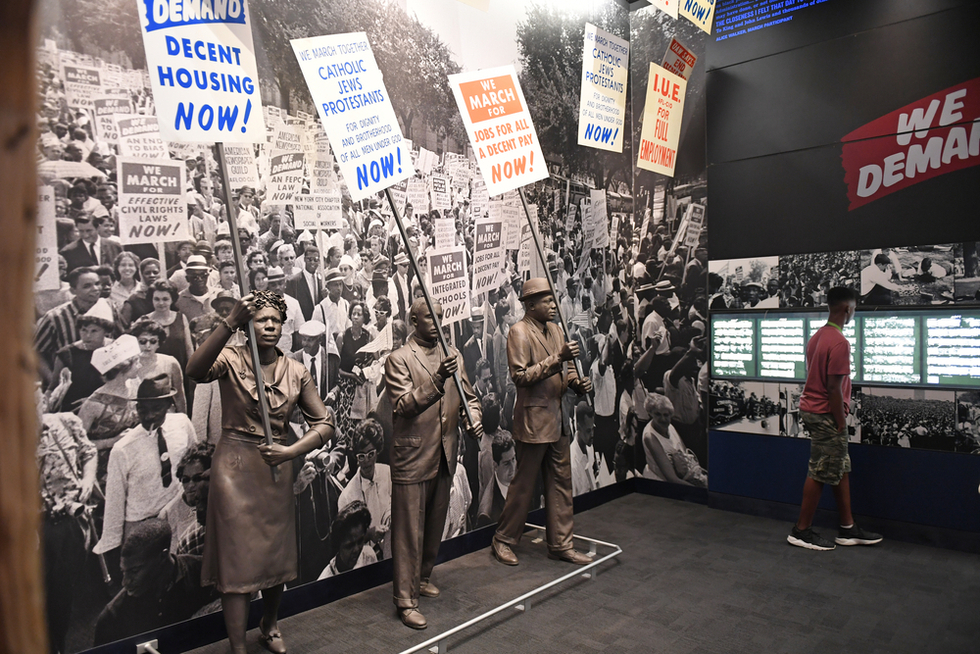For many people, the city of Memphis is synonymous with one of the most significant, and saddest, events in recent American history -- the assassination of Dr. Martin Luther King, Jr. The Lorraine Motel, where King was staying when he was shot, has in the years since the assassination become the National Civil Rights Museum (pictured above).
Long before the civil rights movement brought King to Memphis, the city had already become one of the most important cities in the South for black people. After the Civil War and the abolition of slavery, Memphis became a magnet for African Americans, who came here seeking economic opportunities. Beale Street was where they headed to start their search. Beale Street's most famous citizen was W. C. Handy, the father of the blues, who first put down on paper the blues born in the cotton fields of the Mississippi Delta. W. C. Handy Park, with its statue of the famous blues musician, is about halfway down Beale Street, and Handy's small house, now the W. C. Handy House Museum, is also now on Beale Street. At the Memphis Rock 'N' Soul Museum, just a block off Beale Street, you can learn more about Handy and other famous African-American blues musicians who found a place for their music. Best of all is the Soulsville USA: Stax Museum of American Soul Music, which has been drawing rave reviews since it opened a few years ago in a resurgent South Memphis neighborhood. Another museum with exhibits on famous black musicians is the Pink Palace Museum.
Church Park, on the corner of Beale and Fourth streets (and once the site of a large auditorium), was established by Robert R. Church, a former slave and Memphis businessman who became the city's first black millionaire. The park was a gathering place for African Americans in the early 1900s, when restrictive Jim Crow laws segregated city parks.
Gospel music was part of the inspiration for the blues that W. C. Handy wrote, and that music came from the churches of the black community. The tradition of rousing musical accompaniment in church continues at many of the city's churches, but none is more famous than the Full Gospel Tabernacle, 787 Hale Rd. (tel. 901/396-9192), which is where one-time soul-music star Al Green now takes to the pulpit as a minister. Sunday service is at 11am. Mason Temple Church of God in Christ, 930 Mason St. (tel. 901/947-9300), is the international headquarters of the Church of God in Christ and was where Dr. Martin Luther King, Jr., gave his "I've been to the mountaintop" speech shortly before his death. Tourists are welcome to visit and step inside. Donations are accepted. Sunday services are no longer held here, however.
If you'd like a guide to lead you through the most important sites in Memphis's African-American heritage, contact Heritage Tours (tel. 901/527-3427), which offers both a 1-hour Beale Street Walking Tour and 3- to 4-hour Memphis Black Heritage Tour.
Heritage Tours also visits another worthwhile out-of-town attraction, the Alex Haley House Museum (tel. 731/738-2240). If you prefer to go on your own, it's a pleasant day trip by car to reach the small town of Henning, about 45 miles north of downtown Memphis on U.S. 51. The home is now a museum containing memorabilia and old portraits of the Haley family. Nearby is the family burial site, where Haley (author of Roots: The Saga of an American Family) and many of his ancestors, including Chicken George, are buried. The museum is open Tuesday to Saturday 10am to 5pm and Sunday 1 to 5pm. Admission is $10 for adults, $9 for seniors and $8 for kids.
Note: This information was accurate when it was published, but can change without notice. Please be sure to confirm all rates and details directly with the companies in question before planning your trip.









